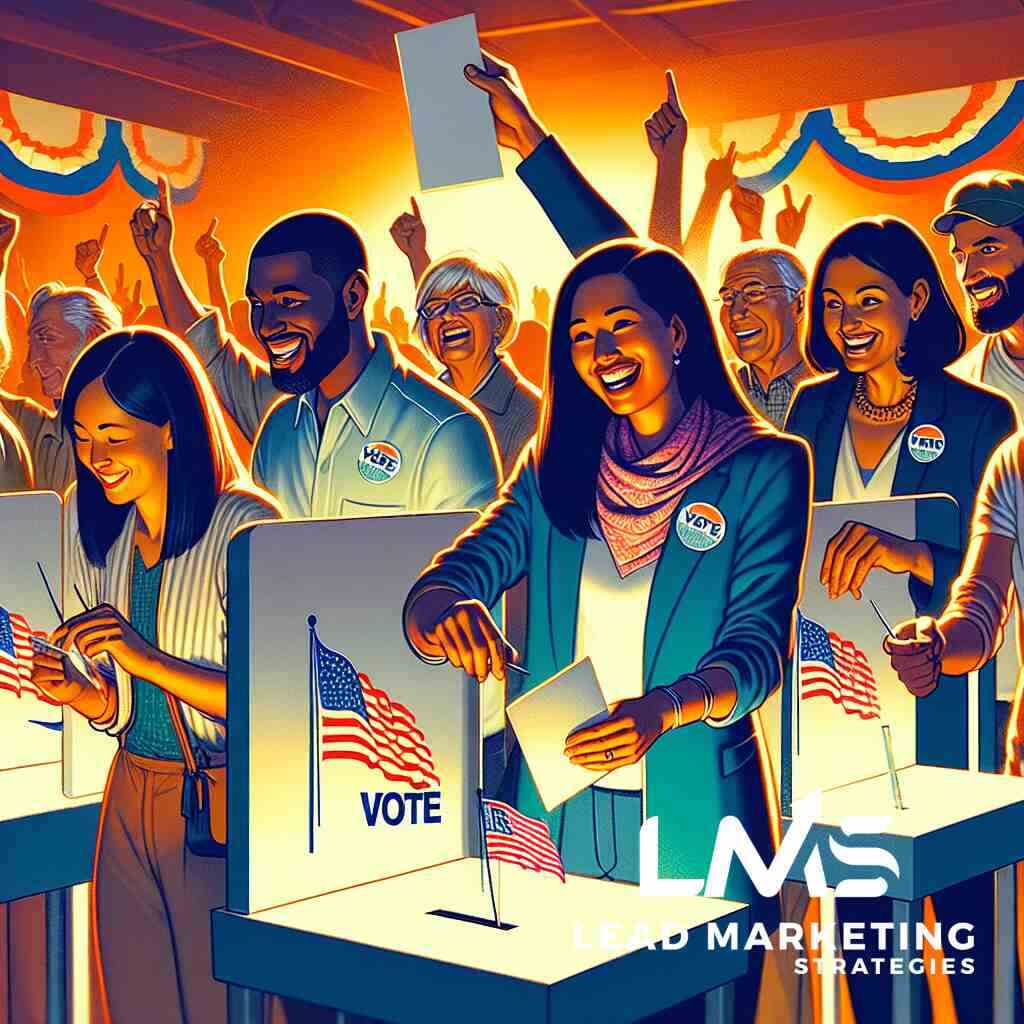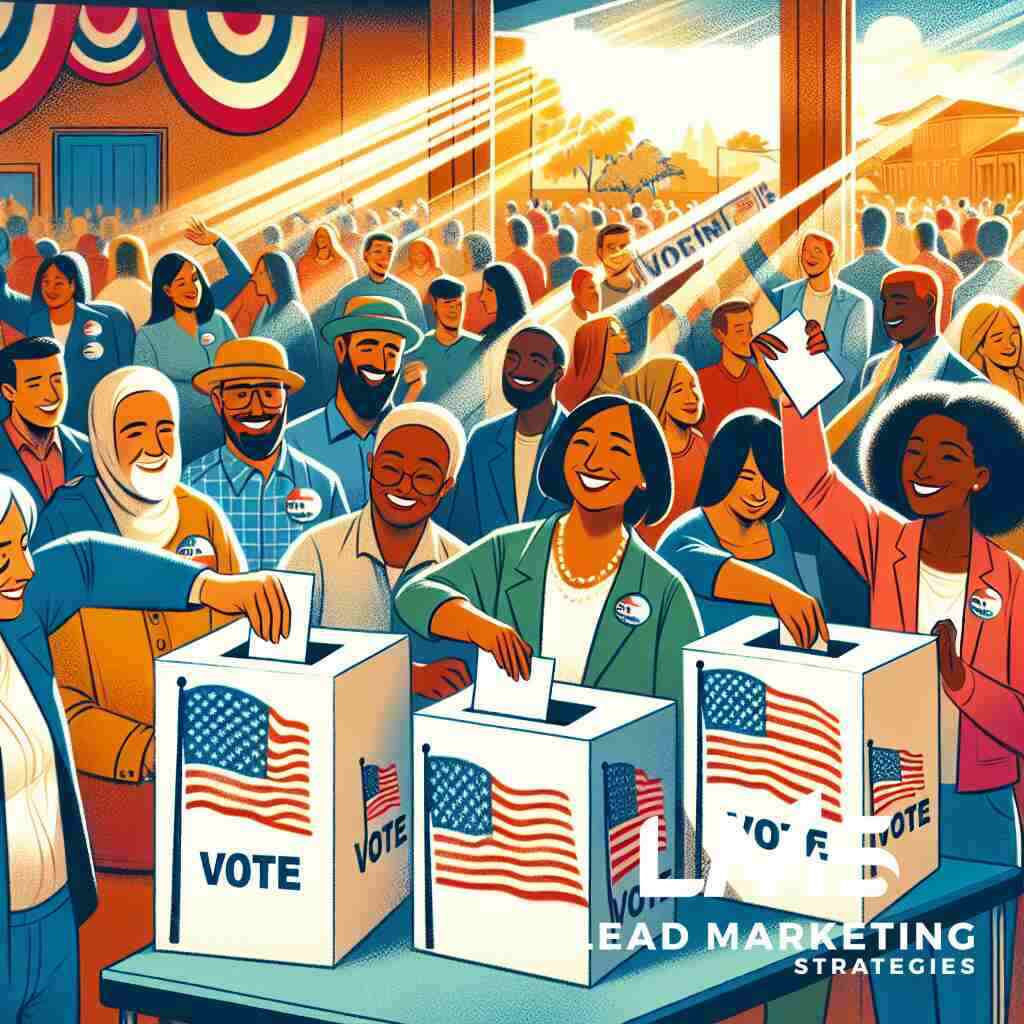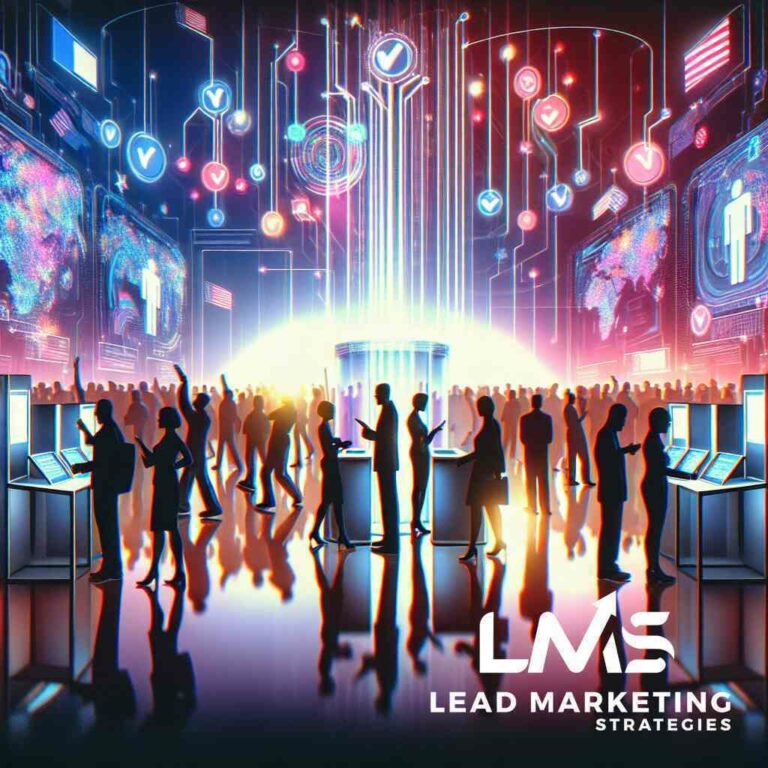Introduction to the Digital Political Revolution
The Convergence of Technology and Politics
The intertwining of technology with politics has fundamentally reshaped how political campaigns are conducted. Beyond traditional outreach methods, the digital transformation has ushered in new platforms and strategies that redefine voter engagement. Technology enables dynamic interactions with voters, elevating political outreach with AI support to unprecedented heights. In this age of swift information exchange, political campaigns are evolving with a focus on data-driven methodologies and AI-enhanced political communication strategies.
Defining AI’s Role in Political Marketing
Artificial intelligence is revolutionizing political marketing strategies by offering precise targeting and personalization opportunities that were not previously possible. AI integrates seamlessly into various aspects of political campaigns, including AI-driven voter engagement, predictive modeling in electoral strategy, and automated political advertising. The technology ensures campaigns are not only heard but resonate deeply with targeted audiences. This nuanced approach allows candidates to maintain a consistent and impactful message throughout their campaign journey.
Transforming Campaign Strategies with Data and AI
Data and AI are instrumental in transforming how political campaigns strategize and execute their plans. The use of electoral data analytics enables the creation of responsive and effective campaign tactics. Campaign personalization using AI enables tailored messaging that addresses individual voter preferences and concerns directly. By leveraging AI-powered campaign insights, political entities can adapt and refine their strategies in real-time, ensuring a competitive edge in the modern electoral landscape. This method secures not only an agile approach to campaigning but also a fortified path to success.
Harnessing AI for Strategic Political Campaigns
AI-Driven Voter Engagement Techniques
Artificial intelligence plays a pivotal role in revolutionizing AI-driven voter engagement techniques. By utilizing sophisticated algorithms, political campaigns can predict voter behavior with remarkable accuracy, enabling them to tailor their engagement strategies effectively. Automated systems now manage a vast amount of voter data, enabling campaigns to identify trends and patterns that human analysis might overlook. Engaging with voters has transformed from a generic approach into a precise and personalized strategy. This adaptation facilitates the formation of meaningful connections with the electorate, ensuring that political messages not only reach voters but also resonate on a deeper level.
Artificial intelligence is also optimizing the timing and channels through which campaigns reach out to potential supporters. Lessons gleaned from past campaign data help AI determine the optimal moments for engagement and the most effective platforms to use. This methodology ensures that outreach efforts align with voter availability and preferences, increasing the chances of message retention and support mobilization. Moreover, AI’s ability to engage across multiple digital platforms simultaneously makes it an indispensable tool in modern political marketing strategies.
Campaign Personalization Through Machine Learning
Machine learning has become a cornerstone in the effort to customize campaign interactions with voters. By analyzing vast datasets, campaigns can identify key voter segments and adjust messaging to meet their specific interests and concerns. This tailored approach to political communication enhances the effectiveness of campaign efforts, as voters are more likely to respond positively to messages that reflect their personal beliefs and values. Moreover, campaigns can dynamically adjust their strategies based on real-time voter feedback and engagement metrics.
Machine learning algorithms enable campaigns to deliver personalized content across different media, presenting voters with a consistent and relatable narrative. This personalization extends to varied communication channels, including email, social media, and targeted digital ads. When political entities employ campaign personalization using AI, they can create a unique and compelling voter experience that differentiates them from their competitors. By finely tuning their messaging, campaigns can foster stronger voter relationships and increase the likelihood of electoral success.
AI’s Impact on Political Messaging and Communication
AI significantly influences political messaging and communication by enabling campaigns to finely craft and distribute their narratives. Through the use of natural language processing and sentiment analysis, AI systems can assess public sentiment towards specific issues and help campaigns develop messages that resonate. This ensures that political communication remains relevant and impactful throughout the electoral cycle. Furthermore, AI tools enhance the precision of message deployment, enabling more effective targeting of specific voter demographics.
Beyond message formulation, AI enables campaigns to monitor and analyze voter reactions in real-time, allowing for immediate adjustments to communication strategies. The integration of AI in political messaging not only supports the delivery of tailored content but also facilitates the forecasting of potential voter reactions to campaign initiatives. As campaigns become more AI-driven, the reduction of manual analysis requirements enables campaign teams to focus on more strategic decision-making processes. The seamless integration of artificial intelligence in political communication is redefining the electoral landscape, providing a competitive advantage in an era of rapid political transformation.

The Mechanics of AI in Election Strategies
Predictive Modeling for Electoral Success
Predictive modeling stands at the forefront of political campaign success and AI, using sophisticated algorithms to forecast electoral outcomes with remarkable accuracy. By analyzing historical voting patterns and demographic data, AI tools can provide campaigns with insights into potential voting behavior. This advanced approach enables candidates to allocate resources more efficiently, focusing their efforts on swing regions that are pivotal for electoral victories. Harnessing predictive modeling in electoral strategy not only enhances strategic planning but also empowers campaigns to anticipate challenges and tailor messaging accordingly.
Furthermore, predictive modeling offers precision targeting opportunities, identifying key voter segments that are most likely to support specific candidates. This level of detail in electoral analytics ensures that campaigns engage effectively with undecided voters, maximizing their potential to sway the electoral balance. As campaigns continue to embrace these AI-driven techniques, they gain a competitive edge, transforming traditional campaign strategies into data-informed powerhouses. Incorporating AI into the electoral framework fosters an environment of strategic agility and foresight that could define the future of political contests.
Automated Political Advertising: A New Frontier
Automated political advertising represents a new frontier in campaign strategy, transforming how candidates communicate with their constituents. This political campaign automation leverages AI to create, manage, and optimize political ads across multiple digital platforms. By enabling real-time ad delivery adjustments based on voter interactions and feedback, campaigns achieve a level of responsiveness and efficiency that traditional methods cannot match. Automated systems ensure that political messages are both timely and contextually relevant, increasing the likelihood of positive voter reception.
Additionally, AI-powered automation enables precise budget management, allowing campaigns to allocate their financial resources more effectively to high-impact advertising channels. These systems generate insights into the performance of each ad, enabling campaign teams to fine-tune their approaches and maximize engagement and conversion. By adopting automated solutions, political operatives are poised to revolutionize their advertising tactics, reaching constituents with targeted messages tailored to individual preferences and media consumption habits. This dynamic approach broadens voter outreach and enhances the effectiveness of election social media marketing efforts.
AI-Powered Analytics for Voter Behavior Insights
The integration of AI-powered analytics into election strategies provides campaigns with unprecedented insights into voter behavior. By analyzing vast data sets, AI systems identify trends and patterns within the electorate that might otherwise remain hidden. This AI-powered campaign insights capability allows campaigns to adjust their strategies in real time, responding proactively to shifts in public sentiment and emerging issues. Voter behavior insights through AI chart a path forward for campaigns seeking to engage more effectively with their audience.
Using intelligent political data analysis, campaigns can gain a deeper understanding of the issues that resonate most with particular voter demographics. This data-driven approach enables the creation of customized content that addresses the specific interests and concerns of various voter segments. As AI continues to advance, its role in interpreting electoral dynamics will only grow, enabling campaigns to make informed, strategic decisions. The adoption of AI analytics tools symbolizes a transformative leap toward smarter, more responsive political strategies that align with the evolving expectations of the modern electorate.
Optimizing Campaigns with AI Tools
Smart Targeting and Voter Data Analysis
In the realm of political campaigns, smart targeting and voter data analysis have become essential components for success. With the influx of available data, AI-driven political marketing strategies can effectively harness this information to optimize targeting efforts. By utilizing sophisticated AI tools, campaigns can dissect vast amounts of voter information to identify demographic and psychographic trends that were previously undetectable. This detailed analysis enables campaigns to target individuals who are more likely to be receptive to their messages.
Smart targeting also extends to digital arenas, facilitating precise voter engagement strategies across multiple platforms. Social media optimization for campaigns, empowered by electoral data analytics, can revolutionize voter outreach by ensuring that messages reach the right audiences at the right times. By embracing digital transformation in political marketing, campaigns can leverage AI-enhanced political communication to refine their messaging and improve voter connection. This approach is crucial for those striving to maximize their political brand development and election campaign management.
Integrating AI in Grassroots Campaigns
Grassroots campaigns can greatly benefit from integrating AI into their strategies. Traditionally reliant on community-based efforts and direct voter engagement, grassroots initiatives now have an opportunity to enhance their efforts with AI support. By utilizing campaign AI tools, local campaigns can efficiently manage resources and broaden their outreach without compromising the personal touch that grassroots campaigns are known for.
AI technology enables these campaigns to adapt swiftly, utilizing data-driven insights to formulate effective strategies and tactics. Incorporating AI allows campaigns to turn local voter sentiment into actionable insights, enabling adaptive messaging that resonates with community members. This not only strengthens the campaign’s presence within local networks but also ensures that messaging remains relevant and compelling. Through intelligent political data analysis, grassroots efforts can optimize their campaign personalization with AI, ensuring each interaction is meaningful and productive.
Advanced Tactical Approaches Using AI Insights
To gain a competitive edge, modern campaigns are turning to advanced tactical approaches powered by AI insights. By leveraging AI-powered campaign insights, political entities can make informed decisions that optimize every facet of their strategy, from voter outreach to content curation. This elevated strategic approach incorporates AI electoral forecasting to predict voter trends and behaviors, providing campaigns with a roadmap for future engagement efforts.
Advanced tactics involving campaign strategy powered by intelligent data ensure that campaigns remain agile and responsive to electoral dynamics. Utilizing AI tools like predictive modeling empowers campaigns to preemptively address challenges, allocate resources effectively, and refine messaging. These innovations not only enhance the strategic planning process but also bolster the campaign’s overall impact on the electorate. Embracing these AI-driven methodologies is crucial for any political entity seeking to maintain its relevance and achieve electoral success in an increasingly complex and evolving political landscape.

Conclusion: Embracing the AI-Driven Future
Adapting to the Evolving Political Landscape
The intersection of artificial intelligence and political marketing is crafting a new era for electoral success. As political campaigns grapple with the swift technological advancements, adapting becomes paramount. Campaigns must embrace AI-enhanced political communication to stay relevant. This adaptation involves not only understanding the potential of AI but also leveraging its capabilities to refine voter engagement strategies. The ability to interpret vast datasets and respond to voter needs in real-time signifies an essential shift in campaign dynamics. As digital transformation in political marketing continues to unfold, political entities willing to integrate AI decisively will find themselves at the forefront of political innovation.
Opportunities and Challenges Ahead
The future of political marketing with AI support holds a wealth of opportunities, yet it is not devoid of challenges. On one hand, AI offers unprecedented insights into voter behavior, enabling campaigns to personalize outreach efforts at an unmatched scale. These voter behavior insights through AI are instrumental in crafting compelling narratives and effective campaign strategies. However, the reliance on AI demands a commitment to data privacy and ethical considerations. Campaigns must navigate these challenges carefully, ensuring that technological advancements are balanced with trust and transparency. By addressing these challenges directly, political marketing services can fully leverage AI’s potential while maintaining public trust.
The Vision for Next-Generation Electoral Technologies
The vision for next-generation electoral technologies positions AI as a central pillar in the evolution of political strategies. As political entities continue to embrace AI-driven innovations, they unlock new possibilities for engaging with constituents effectively. This vision includes the seamless integration of campaign AI tools that enhance decision-making and strategic planning. The shift towards AI-centered electoral analytics marks a transition towards campaigns that are not just reactive but proactive, anticipating voter needs and trends. By harnessing the capabilities of AI, campaigns can establish a resilient framework that fosters long-term political success, ensuring they remain competitive in an increasingly digital electoral environment.
As the political landscape continues to move towards AI-powered methodologies, the role of firms like Lead Marketing Strategies becomes increasingly indispensable. Equipped with the expertise to navigate this digital transformation, they provide political marketing solutions that not only meet but exceed campaign goals. By embracing AI innovations and remaining adaptable to changes, campaigns can secure their place in the future of political marketing.
Frequently Asked Questions
Question: How does artificial intelligence enhance voter engagement strategies according to “Exploring the Future of Political Marketing with AI Support”?
Answer: Artificial intelligence significantly enhances voter engagement strategies by allowing for sophisticated AI-driven voter engagement. With AI, political campaigns can analyze vast amounts of voter data to predict behavior and tailor their approaches accordingly. This enables the creation of highly personalized communication that resonates well with different voter demographics. Moreover, AI optimizes the timing and channels of outreach efforts, ensuring messages are delivered when and where they are most effective. Political Marketing Strategies leverages these advanced techniques to help campaigns not only engage voters but also deepen their connections with them. Political Marketing Strategies leverages these advanced techniques to help campaigns not only engage voters but also deepen their connections, ensuring that political messages are not only heard but are also influential and memorable.
Question: What role does machine learning play in campaign personalization, and how is this integrated into Political Marketing Strategies?
Answer: Machine learning is crucial for campaign personalization as it allows for the analysis of extensive datasets to tailor political messages that align with individual voter interests and concerns. Through the use of machine learning algorithms, campaigns can dynamically adjust their communication strategies and deliver personalized content across various platforms, including social media and email. By partnering with Political Marketing Strategies, campaigns can leverage these AI-enhanced political outreach capabilities to foster meaningful connections with voters, thereby enhancing their chances of electoral success. This approach not only differentiates them from competitors but also builds stronger, more trustful relationships with the electorate.
Question: Can you explain how AI-powered analytics transform campaign strategy based on the insights shared in “Exploring the Future of Political Marketing with AI Support”?
Answer: AI-powered analytics are transformative for campaign strategy as they provide detailed insights into voter behavior, enabling campaigns to adapt strategies in real-time. By utilizing electoral data analytics, campaigns can identify emerging trends and voter preferences, allowing them to refine their messages and resource allocations effectively. Political Marketing Strategies uses these analytics to empower campaigns to make informed decisions and stay ahead of the competition, ensuring campaign strategies are both agile and data-driven. This adoption of AI technology ensures campaigns are not only reactive to current trends but also proactive in addressing future challenges, paving the way for successful political brand development and electoral campaign management.
Question: How does predictive modeling influence political campaign success according to “Exploring the Future of Political Marketing with AI Support”?
Answer: Predictive modeling is a game-changer in political campaign success as it utilizes sophisticated algorithms to forecast electoral outcomes accurately. By analyzing historical voting patterns and demographic data, AI tools can provide deep insights into voter behavior. This allows candidates to allocate resources strategically to regions that are crucial for electoral victories. At Political Marketing Strategies, we integrate predictive modeling into our campaign strategy development to offer a competitive edge, enabling campaigns to preemptively address challenges and optimize their communication and outreach efforts for maximum impact.
Question: What challenges and opportunities come with the integration of AI in political marketing, as highlighted by Political Marketing Strategies?
Answer: The integration of AI in political marketing offers numerous opportunities, such as the ability to gain unprecedented insights into voter behavior and personalize outreach on a massive scale. However, it also poses challenges that include upholding data privacy and navigating ethical considerations. Political Marketing Strategies is committed to balancing these advancements with trust and transparency, ensuring that while we harness the power of AI, we do so responsibly and ethically. By addressing these challenges head-on, we position ourselves and our clients at the forefront of the digital political transformation, offering resilient, effective solutions in the political marketing landscape.



